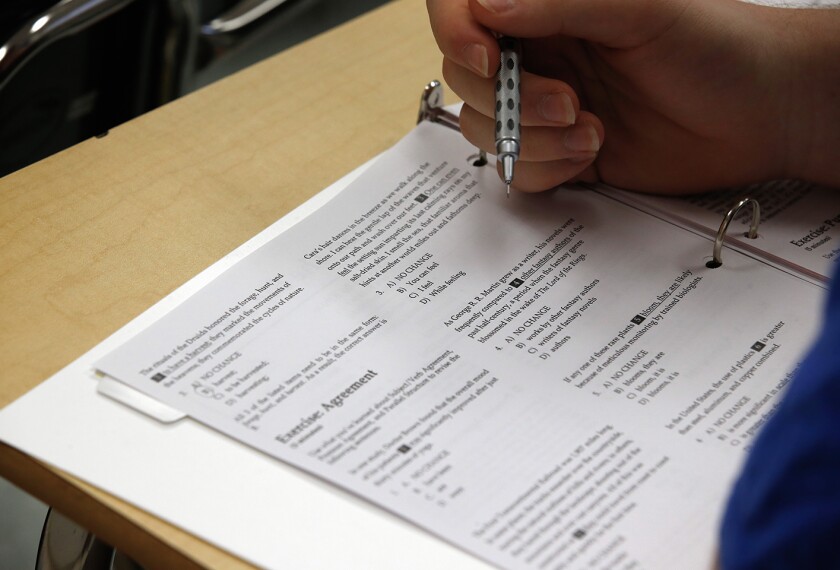Editor’s intro: This spring, Robert J. Fitzgerald, Social Science Department Chair at University High School in Normal, Illinois, is serving as a Fulbright Distinguished Teacher at University College London, Institute of Education. Here he shares some ideas, based on his classroom observations, which may help American teachers and administrators.

I have been at University College London’s Institute of Education working with colleagues on the Justice to History project and spending time observing and teaching in schools in and around London. I have already gained insight into, and admiration for, the uniqueness of the UK educational system compared to that of the United States. Although no education system is perfect, the UK system has many qualities that educators outside of the UK might consider learning about and possibly adopting. Below are four such qualities.
1. Head Teachers Are Still Teaching
In almost every school I have visited, the head teacher—equivalent of a U.S. school principal—still teaches at least one class. In fact, at one school I visited, the national Ofsted (Office for Standards in Education) team evaluated the head teacher’s class during their annual review. In another, the head teacher taught a course to half of the student body during one term and the second half during the other term. This engagement can positively impact a school’s culture in many ways, the most obvious being the opportunity to get know the students in a much different capacity than from a desk in the front office. This also helps ensure that the administration does not “lose touch” (and is not perceived to have lost touch) with what is going on in the classrooms of the schools they lead.
2. Staff Prioritize Collegial Time
Schools in the U.S. rarely present opportunities for teachers to meet socially during the school day. In every school I observed in London, a twenty-minute block of time was scheduled midmorning where teachers met in either their department offices or the general staff room for tea or coffee, biscuits, and conversation. Although much of the talk was education-oriented and professional as much as personal, the chance to take a break together and have some collegial time that is not part of a scripted meeting or professional development program had a powerful impact on the overall happiness of those I observed. As teacher burnout is a phenomenon yet to reach the UK to the extent it has in the United States, maybe there is something to the midday break!
3. Schools Use Staggered Scheduling
Whereas in the U.S., most teachers teach the same class at the same time every day of the week, this is not the case in UK schools. Rather than referring to them as classes, students attend lessons that are at different times on different days. A UK teacher might have a double-lesson on Monday with one class and not see them again until Wednesday for a single lesson. This is a refreshing system that can eliminate some of the monotony of the week for teachers. For students, not having the same schedule every day can be similarly refreshing. This also allows UK students to take more classes than U.S. students during the course of a year, which introduces them to a wider array of subjects. For teachers, repeating a lesson more than once a day or even a week appears to be rare. Although this means there is more preparation for different lessons each day, this doesn’t seem to bother the UK teachers I observed.
4. Upper-Level Independent Inquiry

The last two years of UK schooling are referred to as Sixth Form and take place in what are called colleges. The equivalent of our junior and senior years of high school, the experience is unique in that much of the learning done at this level is independent and related to a student’s choice of subject to study. Preparing for their A-level exams (the scores relate directly to university acceptance), students are guided by their teachers through lessons rather than passively lectured to. Within certain parameters, students select topics and questions to research, all of which are writing-oriented. Teachers at this level prepare lessons designed to give some background knowledge into the overarching topic, but that focus more on skills such as historical interpretation. Much of the responsibility for learning rests on the shoulders of students at this level, a good way to prepare them for the challenges of university that are soon to come.
I believe that many of the things UK schools are doing can be adopted or amended to fit our system in the United States. These four aspects of UK education just happen to resonate with me as I contemplate my own pedagogy and professional philosophy. As critical reflection should always be an important part of education, thinking about how other systems, such as the UK’s, might have positive attributes that could be blended with what we do is something we should all embrace. If such approaches might help even one student, isn’t it at least worth thinking about?
Connect with Robert and Heather on Twitter.
Quote image courtesy of Pablo. Photo of author teaching is courtesy of the author.




